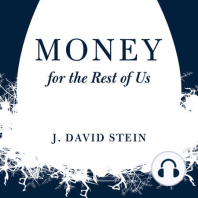27 min listen
Do You Have Dollars and Sense?
ratings:
Length:
27 minutes
Released:
Jan 10, 2018
Format:
Podcast episode
Description
#187 Why opportunity costs should be our primary frame for deciding what to buy instead of anchoring, mental accounting or whether we pay with a credit card or cash. More information, including show notes, can be found here. Episode SummaryWhen David noticed that a new book by Dr. Dan Ariely and Jeff Kreisler was actually titled, “Dollars and Sense,” he couldn’t believe his eyes. That’s one of the most tired and overused phrases when it comes to financial writing and publication. Yet, there it was, a best seller on Amazon. The title wasn’t enough to keep him from reading the book and he’s very glad that he did. This episode highlights some of the concepts expressed in the book including the difference between investment and speculation, what it means to do malleable mental accounting (which is not a good thing), and why we need to consider opportunity costs when making purchases. If you want to have sense in the way you use your dollars, this episode is for you.This episode is about spending dollars while maintaining your common sense… and why many of us are not able to do itAll of us fall into strange patterns of behavior when it comes to spending money. We can either be far too stingy and refuse to spend money for things we legitimately need, or we can convince ourselves that a purchase we desire to make is for our good or in our best interest when the facts reveal something different. David has a great way of explaining why those kinds of things happen and on this episode uses his own back and forth experience when buying furniture to demonstrate the good, the bad, and the expensive of making purchases for both good and bad reasons.Be careful that you don’t convince yourself that a purchase is an investment when it’s really nothing more than speculationAs David and his wife were shopping for furniture they came across many beautiful but expensive antique pieces. The outcome of their furniture shopping is quite ironic because David started out feeling a bit of pain about having to spend money at all – and he wound up purchasing some of the most expensive pieces they found in their shopping adventure. How did it happen? One of the ways was that David convinced himself that the purchase of antiques was actually an investment because the value was likely to increase over the years. But according to all rational definitions, that is not investing, it is speculating.Malleable mental accounting: How you convince yourself to spend money for reasons you never intendedIf you want to truly use common sense when spending your dollars, you need to understand a phenomenon called malleable mental accounting. It describes the way we convince ourselves that a purchase makes sense when it actually doesn’t make sense according to the budget. It’s a way we justify or convince ourselves that the purchase we are making is a good one when actually it may not look good on paper at all. Find out how David struggled with his own form of malleable mental accounting when he and his wife were purchasing furniture for their new home.Are you aware of your own confirmation bias? If you can be you will grow in your ability to change your decision making for the betterMany times after we make a purchase, we begin searching for ways to convince ourselves that it was actually a smart decision. In David’s case, he began researching the price of antique furniture similar to what he had purchased in an effort to show that he did not spend as much money as he could have, and to that end he was successful. But that’s not the point. What he was doing had nothing to do with whether or not his furniture purchase was truly a good decision, it had to do with making himself feel better about the large amounts of money he had spent. David contention is this: If we can become aware of the reasons we spend money the way we do, we can begin to change our decision-making for the better. That’s the lesson David wants to teach you through his own furniture buying experience.In
Released:
Jan 10, 2018
Format:
Podcast episode
Titles in the series (100)
Live Like You're Already Retired by Money For the Rest of Us
